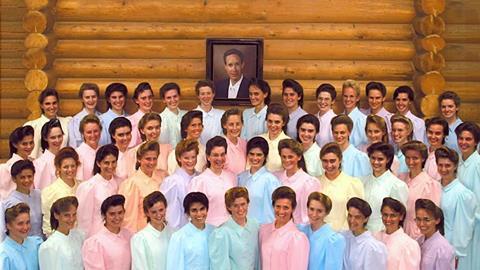Dir/scr: Amy Berg. US. 2015. 90mins

In the age of Serial, This American Life and the rise of podcasts, the story of Prophet’s Prey would have made for a great radio series. Whether the sleepy, droning voice of Warren Jeffs, the megalomaniacal leader of the Fundamentalist Church of Jesus Christ Latter Day Saints (FLDS), or the short audio recording that provided undeniable proof of his sexual abuse of adolescent girls, the best moments in the new documentary from Oscar-nominated director Amy Berg (Deliver Us From Evil) are entirely audio-based.
Prophet’s Prey is more effective at presenting the enigmatic figure of the Prophet himself. His drawling somnolent voice hovers over the movie like a menacing ghost, ominously intoning prophecies such as “All of you are not going to survive.”
As a piece of filmmaking, however, the documentary is as drab as the prairie dresses worn by FLDS’s female members. Already acquired for U.S. broadcast by Showtime, the documentary could also see some foreign TV play, given its depiction of yet another creepy American religious cult.
In the beginning, employing a Voice of God narrator and hand-drawn animation that seems out of place from the rest of the documentary, Prophet’s Prey briefly explains the history of the FLDS as a fringe offshoot of the Mormons. Separated from the official LDS Church in order to preserve the practice of polygamy, the fundamentalist group settled in a remote area of Utah. Lead by a man named Warren Jeffs, the film recounts how Jeffs rose to power, increased tighter controls on the community through indoctrination and intimidation, took on dozens of wives—approximately 90, at last count—and in the process, also sexually abused an undetermined number of the sect’s children.
Berg chooses to tell the story largely through the voices of two outsiders: author Jon Krakauer (who wrote the LDS nonfiction book Under the Banner of Heaven: A Story of Violent Faith) and private investigator Sam Brower (whose 2011 book shares the film’s name). As Krakauer and Brower recount their dual investigations into Jeffs and the FLDS, there is a lot of talk about the community and the struggles of those within it, but Berg has limited access to its actual members.
Admittedly, there are a small handful: one brave Jeffs son comes forward to talk about the abuse; a young wife also testifies about her experience trying to break free; and one of Jeffs’s brothers and one of his sisters also speak out. But the documentary always feels removed from its core subjects. This presents several awkward moments, as Krakauer and Brower offer conjecture or second-hand accounts, with Berg left to fill in the details with news reports.
After establishing Jeffs’s queasy God-complex, the strictures of the FLDS and finally an FBI investigation into his actions, the film shifts gears when Jeffs goes underground. Again, through Krakauer and Brower, the documentary chronicles the effort to catch the fugitive prophet, and then, after he is finally captured, the subsequent court case. Late in the film, we go back to the compound and hear further stories of families being broken apart and girls being removed from their parents.
For a film called “Prophet’s Prey,” however, the documentary remains surprisingly vague about the extent of Jeffs’ abuses. During the court case, the film unveils the unsettling few seconds of tape recording—which is both tame and yet utterly atrocious—of Jeffs with a 12-year-old-girl. But Berg offers no court transcripts or other information about other testimony that may have come forth during the trial.
Prophet’s Prey is more effective at presenting the enigmatic figure of the Prophet himself. His drawling somnolent voice hovers over the movie like a menacing ghost, ominously intoning prophecies such as “All of you are not going to survive.” Though there are few actual video recordings of Jeffs—the most defined observe him sitting behind bars during a deposition or standing in his jail cell—these rare glimpses only add to his eerie mystique. And that Jeffs remains in power, despite his prison sentence, is chilling indeed.
Production company: Imagine Entertainment, Disarming Films
International sales: Showtime, www.sho.com/sho/home
Executive producer: Brian Grazer, Ron Howard, Jon Krakauer, Regina Kulik Scully, Geralyn Dreyfous, Dustin Lance Black, Shannon Costello, Anna Culp
Producers: Erica Huggins, Katherine Leblond, Sam Brower, Amy Berg
Editors: Scott Stevenson, Brendan Walsh
Music: Mark Degli Antoni





















